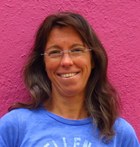The project involves three Italian research units: University of Trieste (Mauro Tretiach PI), University of Udine (Guido Fellet, associated investigator) and University of Bologna (Iris Aloisi, associated investigators), which will work for the following three years in tight connection for the achievement of goals of the project and for knowledge and samples exchange.

Full Professor, University of Trieste
Academic Discipline:
Plant Sciences
Field:
Plant biology, lichenology, ecotoxicology, environmental biomonitoring.
Research interests: ecotoxicology of graphene materials, biology of the lichen symbiosis, use of cryptogams as biomonitors of atmospheric pollution.
Basic research aspects:
Assessment of graphene-related-materials toxicity against aeroterrestrial algae and the seed plants reproduction process;
Standardization of transplant protocols for environmental biomonitoring with mosses and lichens;
Development of an innovative devitalization technique for the eradication of biodeteriogens of outdoor monuments;
Understanding the importance of the water status in determining the responses of epiphytic lichen to pollutants of urban environments;
Constitution, in collaboration with Prof. Nimis (DSV, UniTS), of the most important Italian lichenological herbarium (TSB).
Distinctions and Awards - Director of the Department of Life Sciences since 2018, being Deputy Director between 2012-18. Founding member of the Italian Lichenological Society (1987), member of its board (1993-1999), and President (1999 -2008).

Researcher, University of Udine
Academic Discipline:
Applied Sciences in Agricultural and Environmental Sciences
Field:
Agronomy and Crop Sciences.
Research interests: Application of nanotechnology in agriculture.
Basic research aspects:
Uptake of pollutants by hyperaccumulators plants and crops;
Biochar use for environmental management as well as the study of its effects on pollutants uptake and bioavailability to plants;
Application of nanotechnologies in agriculture for the production of slow release fertilizers;
Use of nanomaterials produced from agricultural wastes and loaded with nutrients (nanofertilizers) to reduce the nutrient leaching, hence the impact of fertilization on the environment;
Observations of the plant response to nanofertilizers compared to the traditional fertilization (either via foliar or soil application) in terms of nutrient use efficiency.

Junior assistant professor, University of Bologna
Academic Discipline:
Plant Sciences
Field:
Plant biology, plant reproduction, abiotic stress, and aerobiology.
Research interests: plant reproduction, pollen-pistil interaction and signalling, pollen allergens characterisation and monitoring, plant response to abiotic stresses.
Basic research aspects:
Reproductive biology in angiosperms, with analysis of factors important for pollen tube growth, pollen-pistil communication, including the self-incompatibility response;
Pollen as a major source of airborne allergens, and the relationships between pollen allergens and pollutants in urban environments;
Plant reproduction and fertilization in response to abiotic stresses;
Effect of abiotic stresses on yield and nutritional parameters of crops.

Post-Doc Researcher, University of Trieste
Academic Discipline:
Plant Sciences
Field:
Plant biology; lichenology; plant ecotoxicology; lichen ecophysiology.
Research interests: Ecotoxicology and environmental fate of graphene related materials, biology of the lichen symbiosis, plant reproduction.
Basic research aspects:
Basic research aspects:
Assessment of the effects of graphene related materials on the reproduction process of seed plants, aero-terrestrial micro algae and soil fungi.
Assessment of graphene related materials biodegradability by wood-degrading and saprotrophic fungi to determine the possible persistence of graphene in the environment.
Desiccation tolerance of lichens and their isolated photo- and mycobionts to unravel possible emerging properties deriving from the instauration of the symbiotic lifestyle.
Characterization of lichen photobiont and mycobiont release of metabolites under relevant environmental conditions to study signalling between symbionts before and during the initial stages of lichen symbiosis.
Distinctions and Awards
2018 "Travel Award" from the scientific committee of the international congress "NanoTox 2018" for the oral contribution entitled "Gaphene based materials affect the pollen performance of Nicotiana tabacum and Corylus avellana".
2016 "Travel Award" to attend the 8th Congress of the International Association of Lichenology (8) and to present an contribute entitled: "Transition to the glassy state in the lichen Flavoparmelia caperata (L.) Hale: molecular mobility in relation to thallus water content". Award assigned by the British Lichen Society (BLS).
2013 Prof. Carlo Gaggi International Award assigned by the Italian Lichen Society for the PhD project in lichenology
2011 "Alpini Rotariani" Academic Award for the best Masted Degree thesis in the period 2009-2010 on the topic "Environmental promotion and protection of the Friuli Venezia Giulia territory"

Associate Professor, University of Bologna
Academic Discipline:
Agronomy and Field Crops
Field:
Agrometeorology and precision agriculture
Research interests: Soil-plant-atmosphere relations, agrometeorology and agroclimatology.
Basic research aspects:
Digital agriculture, in particular precision irrigation;
Agrometeorological modelling of crops growth and irrigation scheduling and climate change, soil-water-atmosphere relations, evaporation from bare soil and soil characteristics and agricultural plant phenology;
Climate change at local scale, adaptation and mitigation strategies;
Previously work deals with monitoring and modelling of rainfall, runoff and erosion at different time and space scales and of movement of chemicals in both surface and ground water, at a watershed and plot scale.
Distinctions and Awards
In 2006 she was elected in the Board of the Italian Association of Agrometeorology (AIAM), in 2018 she was elected President. From 2010 is Editor in chief of the Italian Journal of Agrometeorology. She is member of the Italian Society of Agronomy.

Associate professor, University of Trieste
Academic Discipline:
Plant Sciences
Field:
Plant biology, botany, mycology, and molecular systematics.
Research interests: biology of lichen symbiosis; fungi, algae, plant and lichen systematics (phylogentics), genetic diversity.
Basic research aspects:
Molecular and morphological (light, TEM, SEM CLSM microscopy) characterization of fungi and algae, free living and in in vitro culture;
genetic diversity of lichenized and not lichenized fungi and algae;
metabarcoding of fungi and plants (aerodispersed and rock-inhabiting).
Distinctions and Awards
2008 Award for the best scientific research activity assigned by the Karl-Franzens University Graz, Graz, Austria.
2008 Travel Award to attend the 6th Congress of the International Association of Lichenology (IAL6) in Asilomar, California (300 US$), U.S.A., assigned by the Mycological Society of America (MSA).
2005 Award for the best master thesis in lichenology during the academic year 2003-2004 assigned by the Italian Lichen Society (Società Lichenologica Italiana, SLI).

PhD Student, University of Bologna
Academic Discipline:
Plant science
Fields:
Plant science, plant biology, crop science
Research interests:
Plant biology, crop resistance to abiotic stresses, climate change, pollution in agriculture.
Basic research aspects:
Characterization of cereal crops for abiotic stresses resistance through the assessment of morphological, physiological and biochemical traits, as well as yield parameters;
Improvement of crop resistance to abiotic stresses, including drought, heat stress and pollution sources.